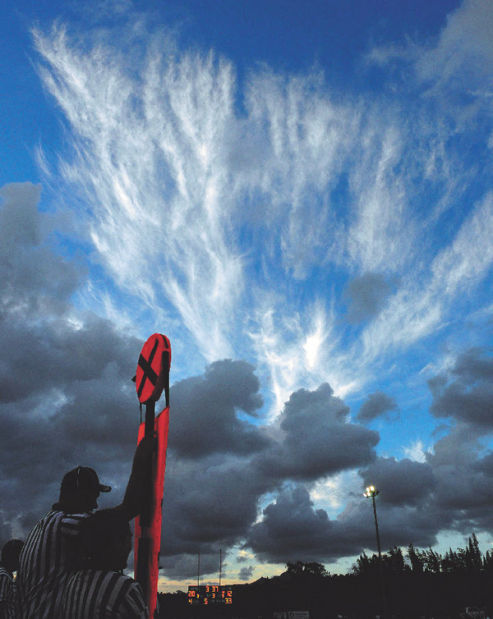LIHUE — A U.S. senator is asking for a reprieve from the county shearwaters settlement that would allow high school night football games again on Kauai. U.S. Sen. Brian Schatz sent a letter Wednesday to Department of Interior Secretary Sally
LIHUE — A U.S. senator is asking for a reprieve from the county shearwaters settlement that would allow high school night football games again on Kauai.
U.S. Sen. Brian Schatz sent a letter Wednesday to Department of Interior Secretary Sally Jewell seeking a natural resource preservation effort that would work with community support.
“I write to encourage you to consider granting a waiver which would allow Kauai high schools to conduct football games for three hours per week during the high school football season in 2014,” Schatz stated in the letter.
On Sept. 10, 2010, the County of Kauai entered into a plea agreement with the U.S. Department of Justice to resolve alleged violations of the Endangered Species Act and Migratory Bird Treaty Act. The acts prohibit unauthorized taking or harming threatened or endangered species and migratory birds.
The county pleaded guilty to violations that resulted in the killing or wounding of more than 18 migratory ‘a’o birds, also known as Newell’s shearwaters. The family includes Hawaiian and Band-rumped Petrels and numbers some 84,000 worldwide with over 90 percent on Kauai, according to the Audubon Society.
Kauai high schools have played football games on Saturday afternoons for the most part since 2009. Schatz is asking for a solution that helps the shearwaters recovery but would also allow for evening football.
“Friday night football has been a valued tradition and a central part of communities across Hawaii for decades, as it is across the country,” Schatz stated.
A limited waiver would show goodwill to a community regarding this issue and engage more participation to create a workable mitigation plan, the letter said.
Kapaa High School Athletic Director Greg Gonsalves said Saturday afternoon game attendance is lower because of conflicts of time and competing activities and daytime heat is a factor for the players. He welcomes the return of night football.
“Friday night lights is the culture of our community and all across the nation,” Gonsalves said.
Kristi Young, deputy field supervisor for the USFWS in Hawaii, said by email on Friday that efforts to create a habitat conservation plan for the Newell’s shearwater are continuing with county, state and other partners.
“Once completed, (the plan) could address several desirable and necessary activities, including football games at night,” Young said. “Our goal with the shearwater, as with all complex issues involving threatened and endangered species, is to work with the local community to find a solution that benefits the public while protecting an irreplaceable native Hawaiian species.”
Chris Farmer of the American Bird Conservancy said he is on the periphery of the shearwaters project but is involved enough to believe the lighting would cause harm.
“The Kauai seabirds are still in a precarious decline and have not recovered enough,” Farmer said. “They are not at a position where we would want to add more stress and cause lower success or have more trouble with fledglings.”
It is still premature to consider lighting up football fields at night, Farmer said. The fledglings still have a long way to go.
Tracy Anderson, who works as the Save Our Shearwaters coordinator at Kauai Humane Society, said she does not conduct population studies, but does work with downed bird recovery and release efforts. She said the fledgling birds get confused by the lighting.
“It is still happening,” Anderson said.
The shearwaters fledgling season begins on Sept. 15 and ends on Dec. 15. During this time the county disconnects non-shielded exterior lights at all county facilities and night football games are not allowed with the exception of four games with additional lighting restrictions.
The shearwaters are native to Hawaii and many nest on Kauai’s inland mountains. Fledglings unable to fly under their own power make their first flights by catching updrafts and gliding toward the sea at night.
Bright lights are blamed for attracting and confusing young birds that land and become vulnerable to predators, vehicles or starvation. The USFWS notified the county of the problem in 2005 and called for a Habitat Conservation Plan to minimize the threat.
Litigation began in 2010 when USFWL reported the county had not yet shielded lights, prepared an HCP, or applied for a permit authorizing takings. The Environmental Crime Section prosecuted the case for the DOJ’s Environment and Natural Resources Division. A plea agreement brought a $15,000 fine and a 30-month probation.
The work to minimize violations included moving football games to afternoons.
District 16 State Rep. Dee Morikawa said it is good to renew the discussion on having Friday night football on Kauai. She said Kauai has done more than most places to improve the habitat for wildlife and its time to revisit the football matter.
“It’s about time that somebody lit the fire,” she said. “Kauai has spent thousands of dollars to convert lighting and are still not able to use it and that is ridiculous.”
The letter from Schatz was sent only after engaging for weeks with county, state and USFWS leaders and constituents, said Meaghan Smith, communications director for Schatz.
”We sent the letter in an effort to encourage dialogue between the parties and to create some initial goodwill which will, hopefully, lead to a comprehensive solution that protects the shearwater and takes into account community priorities,” Smith said.


